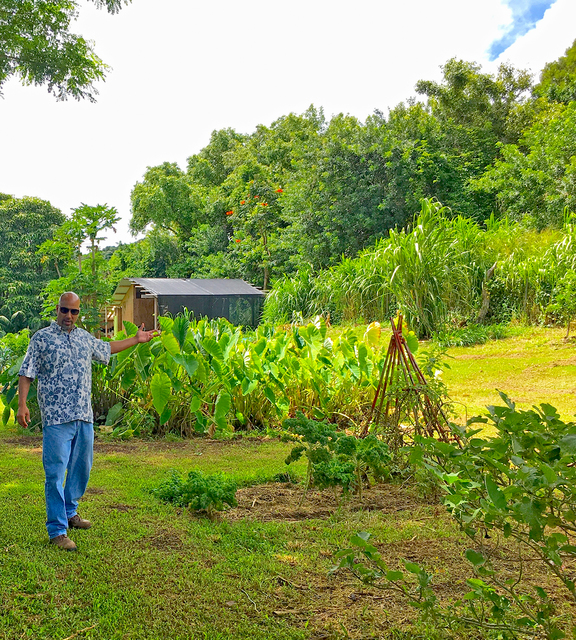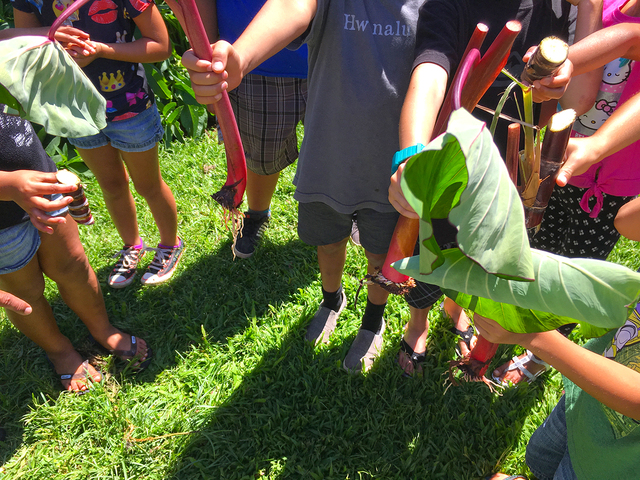KAPAAU — Robyn Pfahl has, so to speak, a lot on her plate. As Hawaii Department of Agriculture’s farm to school coordinator, her latest project has the potential to completely innovate the food served in schools nationwide. ADVERTISING KAPAAU —
KAPAAU — Robyn Pfahl has, so to speak, a lot on her plate. As Hawaii Department of Agriculture’s farm to school coordinator, her latest project has the potential to completely innovate the food served in schools nationwide.
Pfahl met with Kohala Elementary School Principal Danny Garcia and Glenna Shims, director for the schools food service branch of the Department of Education, on June 24 to discuss initial details for a new farm to school pilot initiative that aims to contract directly with local farmers to supply fresh, locally grown food for breakfast and lunch. The program is being piloted at the Kohala School Complex.
Currently, most schools in the U.S. contract with the same company that provides canned and processed foods to jails and hospitals. Lt. Governor Shan Tsutsui initiated a farm to school advisory board last year to begin to tackle such restrictions, going above and beyond national standards.
“The program has five different aspects compared to what is being used nationally,” Pfahl said. “Their three focuses are education, procurement and garden. In Hawaii, the purpose of the Statewide Farm to School Program is to improve student health; develop an educated agricultural workforce; enrich the local food system through the support and increase of local food procurement for the state’s public schools and other institutions; accelerate garden and farm-based education for the state’s public school students; and expand the relationships between public schools and agricultural communities.”
The new initiative is now in the development stage. Pfahl’s role is to bridge connections between Hawaii farms, schools and keiki health.
“I make the connections that make this program possible,” she said. “I am one of many warriors. I am very appreciative for our Lt. Governor and Governor.”
According to Pfahl, the next steps at Kohala School Complex is a needs assessment with a plan for funding, a budgeted timeline and focus groups with local farmers, children and school administrators.
“It is likely to be at least a two-year pilot program,” she said. “A seed has been planted and we will watch it grow. We’re hoping to start the first part right away, doing focus groups.”
Change sometimes takes thinking outside the box.
“This is not the way DOE normally does their business,” Pfahl said. “They have a large responsibility and their purchasing is centralized. But if we can do this at one school, we can set a model to develop different ways of buying. This is local sourcing. It will be a learning lab with the DOE. They are responsible for over 100,000 meals a day at 265 schools on almost every island in Hawaii.”
The initiative also benefits farmers.
“We wanted to open the market to local farmers,” Pfahl said. “Change is difficult and there are a lot of different moving parts, but we need to start somewhere. I’m working on supply and demand. We really need to develop relationships with our farmers. I will work with them and help them raise their production that will meet a more manageable demand of the DOE by district. This is a great step in the right direction. Farm to school can save our children and our farmers.”
Keiki at Kohala School Complex will be involved in developing menus, having nutritional education, farmer outreach opportunities and food waste analysis.
“We can make things our kids know from locally grown foods, developing menus with locally available foods that meet national standards,” Pfahl said.
Garcia fully supports the project.
“The end product is the food on the plate in the cafeteria. The whole vision is healthier food getting to the children and providing business to our local farmers and vendors. It’s a win-win situation,” he said. “I am very thankful that our Complex has been chosen as a pilot school because of the history of farming in our region. Our other two principals and cafeteria director are excited as well. The future will hopefully be all schools with gardens from local farms that provide their own cafeteria with fresh produce.”
Phase two of the pilot project is anticipated to be implemented at a larger DOE complex in Maui, according to Pfahl.
“Healthy children equal healthy communities, healthy living,” Garcia said. “Hawaii really can be self-sufficient.”




